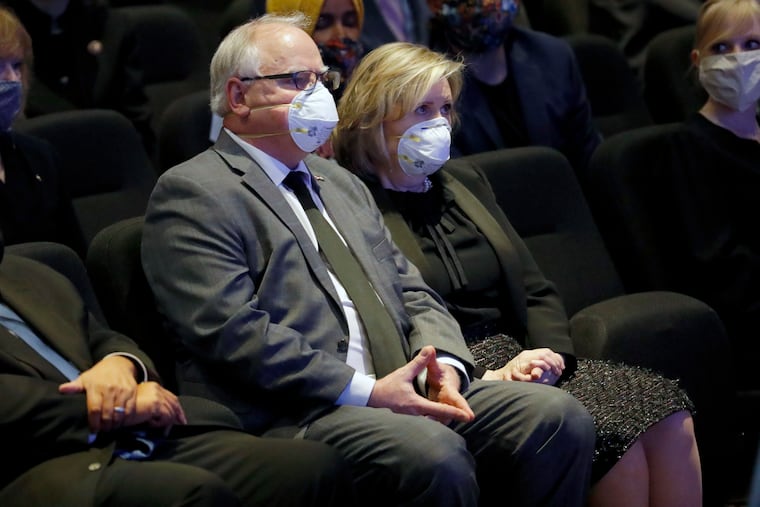Minnesota has passed police accountability measures, including banning chokeholds
Gov. Tim Walz is expected to swiftly sign the Minnesota Police Accountability Act into law after months of pushing for police overhauls following George Floyd's death on May 25.

The Minnesota legislature overwhelmingly approved wide-ranging police accountability measures late Monday, including a ban on chokeholds and neck restraints, almost two months after George Floyd’s death in Minneapolis sparked nationwide protests against racial injustice and police brutality.
The Minnesota Police Accountability Act passed in the Democratic-led House by a 102-29 vote just before midnight, and was then approved in the Republican-led Senate in a 60-7 tally around 2 a.m. Tuesday. It will be sent to Gov. Tim Walz, D, who is expected to swiftly sign it into law after months of pushing for police overhauls following Floyd's death on May 25.
The deal struck in the legislature — which also prohibits warrior-style training for officers, increases data collection surrounding deadly police-involved incidents and requires officers to intervene among other measures — represents one of the most significant changes in the history of Minnesota's criminal justice system, backers said.
"Today, we're beginning to make the overdue changes Minnesotans have been demanding to help ensure no more lives are lost due to police violence," said state Rep. Carlos Mariani, D, author of the bill, in a news release early Tuesday. "By passing this bill into law, we're taking the first steps toward major changes to hold police officers accountable for harmful acts, and we are committed to continuing our work for safer communities."
He added, "It wasn't safe for George Floyd or for Philando Castile, and they deserved a better way to police that builds community."
The House bill, which was authored by members of the People of Color and Indigenous Caucus, also creates a new state unit to investigate deadly police-related incidents, and adds funding for crisis intervention training and incentives for officers to live in the communities where they work. The bill also calls for establishing a council of arbiters to handle cases of police misconduct.
"We have heard the cries for justice, and I'm pleased we have reached an agreement to begin ensuring police are more accountable to the communities they serve," said Minnesota House Speaker Melissa Hortman, D, in a statement.
The agreement in the state's divided legislature comes after negotiations had previously stalled due to partisan finger-pointing, even amid an outcry for unity and immediate action. As The Washington Post's Holly Bailey reported, the state GOP initially refused to ban warrior training for officers, which was formally prohibited by the Minneapolis Police Department but offered as a course by the police union. Democratic-led initiatives to restore voting rights to tens of thousands of convicted felons and appoint Minnesota Attorney General Keith Ellison, D, to prosecute police killings were also rejected by Republicans.
Minnesota Senate Majority Leader Paul Gazelka, R, told local outlets that Republicans had imposed a midnight deadline for the House to pass the bill or go home. Although the legislature had faced an extended impasse, House lawmakers continued to push behind the scenes in recent days to find a resolution for police accountability, Gazelka said to the Star Tribune.
"We've never stopped working on this, whether we were in session or out of session," Gazelka said to the newspaper. "That's something we all felt was important."
While Republican Senate leaders mostly hailed the bill as a success, some Democrats in the body said the police accountability measures were "insufficient."
"This is not good enough," said state Sen. Patricia Torres Ray, D, before voting against the bill.
State Sen. Jeff Hayden, D, who is African American and whose district includes the neighborhood where Floyd was killed, said that while he voted for the bill, he was disappointed that it took months to create — and feared that it doesn’t rise to the national moment on policing.
"While this bill sets the groundwork for the work that we know needs to continue after this, the conversation cannot and will not end there with the passage of this bill," Hayden said in the Senate chamber. "There's a lot of work to protect black bodies."
_____
The Washington Post’s Holly Bailey contributed to this report.